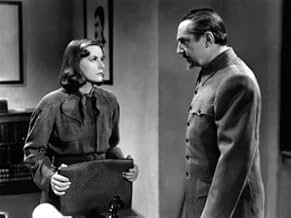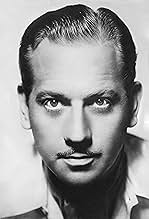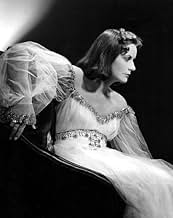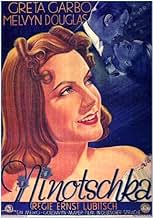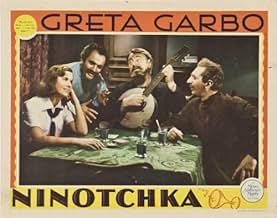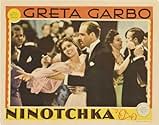IMDb रेटिंग
7.8/10
24 हज़ार
आपकी रेटिंग
आधिकारिक व्यवसाय पर पेरिस में भेजी गई एक कठोर रूसी महिला खुद को एक ऐसे व्यक्ति की ओर आकर्षित होते हुए पाती है, जो हर उस चीज का प्रतिनिधित्व करता है, जिसे वह घृणा करती है.आधिकारिक व्यवसाय पर पेरिस में भेजी गई एक कठोर रूसी महिला खुद को एक ऐसे व्यक्ति की ओर आकर्षित होते हुए पाती है, जो हर उस चीज का प्रतिनिधित्व करता है, जिसे वह घृणा करती है.आधिकारिक व्यवसाय पर पेरिस में भेजी गई एक कठोर रूसी महिला खुद को एक ऐसे व्यक्ति की ओर आकर्षित होते हुए पाती है, जो हर उस चीज का प्रतिनिधित्व करता है, जिसे वह घृणा करती है.
- 4 ऑस्कर के लिए नामांकित
- 5 जीत और कुल 6 नामांकन
Dorothy Adams
- Swana's Maid
- (बिना क्रेडिट के)
Monya Andre
- Gossip
- (बिना क्रेडिट के)
Nino Bellini
- Swana's Restaurant Guest
- (बिना क्रेडिट के)
Wilda Bennett
- Swana's Restaurant Guest
- (बिना क्रेडिट के)
Eumenio Blanco
- Waiter
- (बिना क्रेडिट के)
Symona Boniface
- Gossip
- (बिना क्रेडिट के)
Tex Brodus
- Club Patron
- (बिना क्रेडिट के)
फ़ीचर्ड समीक्षाएं
10rcohen-7
This is a fantastic movie. I can't understand why some people have problems with it. Makes me wonder if we don't have some people recoiling at some innocent cracks made at the Soviet Union's expense. As a romantic comedy it has very few peers and is a great introduction to black and white films for those used only to color. There are a plethora of interesting secondary characters. Garbo is wonderful, of course, and Dougless is as good as I've seen him any film. Lubitsch's direction is masterly, but not 'ground-breaking', a fault for which some are willing to run him under the harrow -- a case of holding someone to impossible standards. Nobody can break new ground in every film -- sometimes we have to settle for mere masterly competence. See this film! Unless you happen to romanticize the former Soviet Union, you will enjoy it.
My all-time favorite comedy! All right, I am a Garbo fan regardless of the role, and I happen to think that Melvyn Douglas was perfectly cast here. In fact, the entire cast excels, without exception, in one of Lubitsch's finest and most elegant films. Those who think that lines like "The show trials were a great success...there are now fewer, but better, Russians" are dated, or that making fun of totalitarianism is tasteless and politically incorrect need to lighten up. Garbo is not only very funny in this classic, she is inexpressibly lovely (as always). A must-see for any lover of beautifully crafted and entertaining film comedies.
An expertly-played and presented comedy that continues to be dogged by detractors for the oddest reasons. Some feel NINOTCHKA suffers compared to Lubitsch's earlier work, finding it formulaic alongside 1933's TROUBLE IN PARADISE. (I hadn't known Lubitsch had been given 'do-what-thou-wilt' privileges from the Hays Office - I'd labored under the delusion he faced the same restrictions in content and tone every other moviemaker did in 1939.) Other nay-sayers decry the film's jabs at Soviet collectivism as 'dated' if not 'unenlightened'. (Huh? You mean show trials and forced starvation of kulaks were GOOD things that a truly witty screenplay would celebrate?) Still other kibitzers squawk over the casting, of all things! (While it IS fun to picture William Powell or Robert Montgomery in the role of Leon, the boulevardier, Melvyn Douglas was never better than he is here. If he has his spotty moments, it's in those scenes where he must swoon with ardor, reciting dialogue that rings a tad purple to the ear; it's quite possible Powell or Montgomery would have fared even worse reading those lines.) Okay, enough defense - now let's go to NINOTCHKA's numerous strengths. Garbo is magnificent; she has a real knack for comedy (her deadpan entrance is hilarious) yet, as always, is able to break your heart with a look, a word, a gesture. Her three 'stooges' (Sig Rumann, Alexander Granach & Felix Bressart) are broadly funny and genuinely endearing. Ina Claire is everything her legend always claimed she was - though her character is icily calculating, you can't hate any woman who can make dialogue bristle like this. Lubitsch is in complete command throughout; his staging and pacing of the proceedings, masterful in its seeming effortlessness. Even the storied Metro glitz shines in NINOTCHKA, right down to the brilliant artifice of Cedric Gibbons' art direction (the Eiffel Tower sets especially). Last but not least is the superb screenplay by (among other hands) the team of Charles Brackett & Billy Wilder. Wisely, their satiric darts are dipped in a curare leavened by wit and sentiment, and while they are thrown with accuracy, their sting is never such that the satire sinks into the mire of political ideology. NINOTCHKA, after all, is about the triumph of love over politics, and to those who feel trapped in the prevailing toilet-ethic of the Farrelly Brothers' blood-poisoning of modern comedy, represents a much-needed antidote. Inoculate yourself at your earliest opportunity.
While it's a given that Greta Garbo was the most enigmatic of film stars during Hollywood's golden age, it's also fair to state that she may be the least relevant today for her austere beauty and cool, sometimes unapproachable demeanor. Yet, all that is erased with this 1939 comedy masterwork which brilliantly teams her with the master of innuendo-filled scintillation, Ernst Lubitsch. With a laser-sharp, witty script by Walter Reisch, Charles Brackett and Billy Wilder (before he became a master director himself), this classic is one part political comedy, one part screwball farce and one part romantic whimsy, all blended impeccably with the famous Lubitsch touch.
The plot involves Nina Ivanovna Yakushova, a Soviet envoy sent to Paris to ensure that the government receives the proceeds from the sale of jewels once owned and still coveted by the Grand Duchess Swana, now an expatriate. The cold, emotionless envoy goes about superseding the three lesser envoys who have been assimilating themselves into the frivolous, capitalistic world of Paris thanks to Count Leon, a tuxedoed dandy and the duchess's constant escort. It is Leon who dubs the envoy Ninotchka, and after initial resistance, the two find themselves falling in love but not at the expense of her convictions about the omnipotence of Communist values. The jewels become a negotiation ploy that complicates their affair as does the Grand Duchess herself. The plot develops in unexpected ways and through such clever observational humor that the ending comes all too soon.
While she is deified by many for the operatic tragedy of "Camille" and the mannered mystique of "Mata Hari", Garbo seems at first to be a parody of her sullen screen image with witty one-liners delivered in hilarious deadpan, but she, like her character, blossoms into a warm, comically romantic presence as the film progresses. It's a wondrous transformation and the one performance that assures Garbo her lasting stature more than any other. As Leon, Melvyn Douglas specialized in William Powell-knockoff roles like this one and while he does get a bit excessive in his 1930's-style romantic gestures, he is sophisticated and genial enough to have us believe Ninotchka may give up Mother Russia for him.
At first, stage legend Ina Claire seems like she will play the Grand Duchess Swana as a dotty ninny, but when her talons show, she is an excellent match for Garbo in their scenes together. As the trio of envoys ensconced in the good life, Sig Ruman, Felix Bressart and Alexander Granach make a merry chorus to the proceedings. I particularly like the scenes back in Russia when they share an omelet dinner with Ninotchka in her Soviet-sanctioned, multiple-occupant room. The print transfer on the 2005 DVD is pristine and brings out William Daniels' sparkling, black-and-white cinematography, though the only extra is the film's original trailer. This is truly a must-see.
The plot involves Nina Ivanovna Yakushova, a Soviet envoy sent to Paris to ensure that the government receives the proceeds from the sale of jewels once owned and still coveted by the Grand Duchess Swana, now an expatriate. The cold, emotionless envoy goes about superseding the three lesser envoys who have been assimilating themselves into the frivolous, capitalistic world of Paris thanks to Count Leon, a tuxedoed dandy and the duchess's constant escort. It is Leon who dubs the envoy Ninotchka, and after initial resistance, the two find themselves falling in love but not at the expense of her convictions about the omnipotence of Communist values. The jewels become a negotiation ploy that complicates their affair as does the Grand Duchess herself. The plot develops in unexpected ways and through such clever observational humor that the ending comes all too soon.
While she is deified by many for the operatic tragedy of "Camille" and the mannered mystique of "Mata Hari", Garbo seems at first to be a parody of her sullen screen image with witty one-liners delivered in hilarious deadpan, but she, like her character, blossoms into a warm, comically romantic presence as the film progresses. It's a wondrous transformation and the one performance that assures Garbo her lasting stature more than any other. As Leon, Melvyn Douglas specialized in William Powell-knockoff roles like this one and while he does get a bit excessive in his 1930's-style romantic gestures, he is sophisticated and genial enough to have us believe Ninotchka may give up Mother Russia for him.
At first, stage legend Ina Claire seems like she will play the Grand Duchess Swana as a dotty ninny, but when her talons show, she is an excellent match for Garbo in their scenes together. As the trio of envoys ensconced in the good life, Sig Ruman, Felix Bressart and Alexander Granach make a merry chorus to the proceedings. I particularly like the scenes back in Russia when they share an omelet dinner with Ninotchka in her Soviet-sanctioned, multiple-occupant room. The print transfer on the 2005 DVD is pristine and brings out William Daniels' sparkling, black-and-white cinematography, though the only extra is the film's original trailer. This is truly a must-see.
Ninotchka is a great film classic with great acting by Melvyn Douglas, who really supports Greta Garbo. Garbo is an actress with class and great abilities not found in movie stars today, she was ahead of her times, deep and spiritual. Her supporting actors, Sig Ruman used every expression he could to portray a fumbling Russian and Bela Lugosi showed the movie industry that he had great acting abilities he was never given a chance show to his many fans.
This film shows aspiring actors just how to perform to the highest level of their art.
This film shows aspiring actors just how to perform to the highest level of their art.
क्या आपको पता है
- ट्रिवियाBela Lugosi received fourth billing even though he appears only near the end of the movie and only in one scene with Greta Garbo.
- गूफ़When Ninotchka tells a funny story, objects on the desk change positions.
- इसके अलावा अन्य वर्जनAlso available in a computer colorized version.
- कनेक्शनEdited into Hollywood: The Dream Factory (1972)
टॉप पसंद
रेटिंग देने के लिए साइन-इन करें और वैयक्तिकृत सुझावों के लिए वॉचलिस्ट करें
- How long is Ninotchka?Alexa द्वारा संचालित
विवरण
- रिलीज़ की तारीख़
- कंट्री ऑफ़ ओरिजिन
- भाषाएं
- इस रूप में भी जाना जाता है
- Ninočka
- फ़िल्माने की जगहें
- उत्पादन कंपनी
- IMDbPro पर और कंपनी क्रेडिट देखें
बॉक्स ऑफ़िस
- बजट
- $13,65,000(अनुमानित)
- दुनिया भर में सकल
- $2,477
- चलने की अवधि1 घंटा 50 मिनट
- रंग
- पक्ष अनुपात
- 1.37 : 1
इस पेज में योगदान दें
किसी बदलाव का सुझाव दें या अनुपलब्ध कॉन्टेंट जोड़ें



